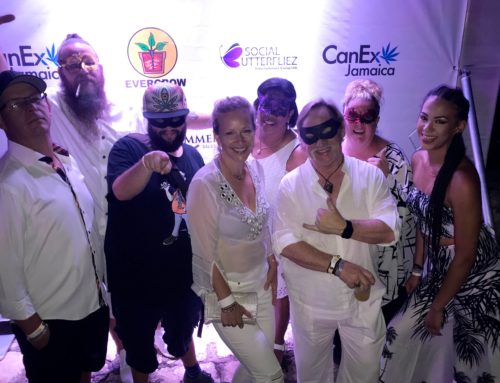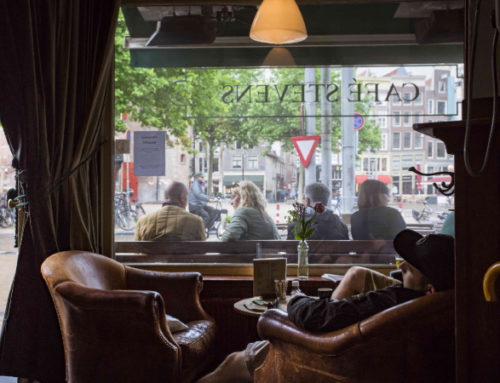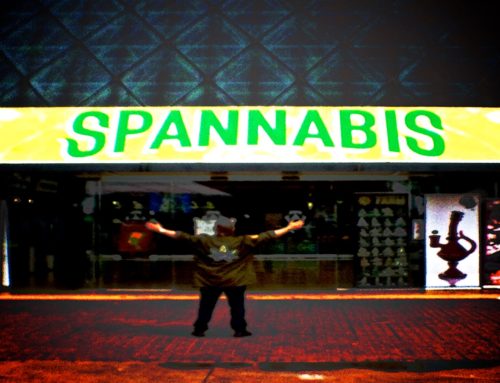CANNABIS CULTURE – When Hans Kamperman wrote his farewell to family and friends on Facebook, he says, he believed his death would be a sacrifice for the entire planet.
“Forgive me this act, I have to do this to shake up politics. I can’t reach them with my message. “Cannabis is criminalised (sic) while it can save the earth and be a medicine for many people. I’m doing this for earth, the people.”
After posting this, the father and grandfather tied a noose around his neck and jumped off a balcony. The date was March 22 of 2018, He did not die, and according to recent interview with Cannabis Culture Magazine, Kampermann said his jump was not an act of desperation, rather it was meant to “shake up the political reality of the Netherlands.” And like other activists who have immolated for their cause, he says he still sees this as the only means to let the world know how dire the situation is for those who’ve been persecuted for using and growing cannabis.
In October 2016, the police raided Kamperman’s home after an anonymous tip about his small-scale home grow. Kampermann had 5 plants growing in his garden. He says he does not smoke cannabis, but he became fascinated by the potential miracles of cannabis oil after a friend of his sought alternative treatments in their battle with cancer.
Kampermann says he was under the impression his garden was legal. But it’s really not.
In the Netherlands the maximum 5 plants are tolerated. This means that police can always confiscate your plants (or plant) if they see them. If you voluntarily give up your plants, you will not be prosecuted (as long as you’re not a minor and have no more than 5 plants). To make things more complicated, a list of criteria was introduced a few years ago to assess growers. If you score two or more criteria on the list, you are considered a professional grower and will be prosecuted as such, no matter how many plants you have.
On the list are things like artificial lightning, selected seeds, use of ventilation etc. In practice it’s almost impossible not to score as a professional grower if you grow indoors.
Kamperman was growing his plants outdoors in his garden in a small greenhouse. This means that he didn’t meet 2 or more of the criteria the police uses to determine if you are a “pro grower”.
In the raid, which he said was his first grow ever, police confiscated 5 plants, each measuring about 3 1/2 meters high, (12 feet), which by the time the police had finished doing the math had added up to 9 kilos of weed.
Kamperman says he told the police he used the weed for making cannabis oil. He told them he made it available to friends who had cancer.
But According to the court, he also told them he had cannabis from others at home. “I was finally convicted of tat,” Kamperman said.
Later he recanted and said he was mistaken. “The weed was all mine. “
Kamperman was found GUILTY by the Court and sentenced to do 80 hours of community service, he immediately lodged an appeal with the Court of Appeal. Kamperman had a lot to lose. Any conviction would put an end to the goodwill project he was heading in Alberta, Canada.
At the appeal, he WON with a complete recall of the community service penalty, but he LOST in that they kept the verdict as GUILTY but without penalty.
Kamperman’s attorney Maurice Veldman says “The Arnhem Court of Appeals made a harsh and devastating judgment in a case that should never have been a case. The Public Prosecutor could just as easily have been declared inadmissible because it was only about the possession of five plants. But no, he was convicted without penalty. A statement that prevented him from entering his beloved Canada. And the court knew all too well. With a lot of power, his story was swept off the table. The Arnhem court is very adept at that.”
Hans Kamperman had been busy making plans for his BLUE LAKE CULTURAL HEALING CENTRE property in Alberta, Canada. He was working on the project with the local First Nations community in the area called “Heal Our Parents and Strengthen Our Families” project.
The project’s mission statement shows us Kamperman’s commitment to sensitivity and helping others:
“The Blue Lake Healing Centre will administer cultural and traditional values to those who are receiving programs and services through Blue River Training and Employment. The clients will learn about the historical significance and importance of the First Nations of today. We will ensure that those who are willing to learn will be shown a positive direction through unique opportunities and self-guided methods.”
With the conviction on his record Kampermann could no longer be part of the Blue Lake Healing Centre.
Kamperman could have just folded up and retreated and gave up on his dream, or he could try to fight back in whatever way he could. He started off well, with a public declaration: “I am now looking for publicity. I am just a well-meaning citizen who has been deceived by the government, who gives the impression that you can grow five marijuana plants. The Justice Department is lying, this does not make sense.”
Then along with his friend and well known cannabis advocate, The Green Ambassador, Darpan Van kuik, they set up a mobile protest van, covered with posters laying out the problems and solutions, and parked it right out front of the top legislative body in the Country in The Hague. They also launched a petition drive initiative to the Dutch people calling for the full legalization of Cannabis in the Netherlands, Including the repeal of the Opium Act.
Otherwise known as The Damocles Act, Article 13b of the Opium Act, was introduced in 1999, to combat the sale of hard and soft drugs from “homes and premises”. After eighteen years it has become a weapon to make cannabis acquirers and home growers homeless.
“The special thing about the Damocles Act is that there is no need to prove that there is drug trafficking. From a certain amount of drugs, usually 5 grams of hemp or 0.5 grams of hard drugs, the mayor may assume that the drugs are intended to be sold. In such a case, the mayor is authorized to close the house because of public order and safety. It is then forbidden to enter the building.”
This is one of the major laws he was fighting against. He committed to sit out there in front of the government “as long as it takes”.
Kamperman and fellow activist Van kuik campaigned hard in front of the Parliament for months in the cold and the rain, engaging politicians, press, police and the public in a effort to bring attention to the injustice of cannabis prosecutions in the Netherlands.
Kampeman and Van kuik watched as a Kurdish group nearby, attempted a weeks long hunger strike to protest and bring attention to the attack by Turkey on the city of Afrin. Tens of Thousands of Kurds were protesting all over Europe. Nobody was paying attention. Kamperman saw that and decided he’d had to go the next level.
Flash forward to March 22nd, Hans Kamperman jumps over the balcony with the noose around his neck. His neck did not break. He landed up in a position which allowed horrified on-lookers to reach him and hold him up to prevent him from choking.
They saved his life.
Kamperman in person appears like senior conservative business man; well dressed and well spoken. He seems caring and committed when he speaks of all that has happened and is sincerely looking for opportunities to bring publicity and thus change to the Netherlands.
Kamperman shared he always supported the betterment of mankind…”First is life with your health and secondly is your future on this planet. Improving it will give us a future.”
He says he thinks that in the Netherlands, “When the Christian (Right) parties, continue to prohibit the use of it; that just makes it only better for the criminals, who see big earnings as it is still black to sell and not legal. Same with the political parties, as the government can get more money in seizing the cars and money of those caught selling. Perhaps a revenue they want to continue…”
Kampermann is a father and grandfather, he says he is willign to pay the ultimate price because he believes liberating cannabis in the Netherlands would mean a brighter future for his offspring, and society as a whole.
“I have grown children and grand children that I want to have opportunities and hemp and cannabis will help them as they grow.” When asked how his children reacted to his plan, “they were not happy at first but now they understand. I thought this through over the last couple of weeks and decided a hunger strike was not a good idea, but perhaps if I gave my life for it, politicians and all would really listen and do something. In the end I did it for my children and for the future of the people. I didn’t share (with anyone) what I was going to do, but it was not a desperate act, it was a act of love for the Earth and for the people.”





Leave A Comment